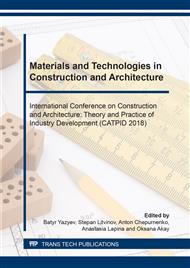p.1194
p.1200
p.1204
p.1210
p.1214
p.1220
p.1227
p.1233
p.1238
Construction Industry’s Regulatory Institutions
Abstract:
The key element of the construction industry is the capital construction, which is finishing and combining efforts of all investment industries and turning material resources into fixed assets, creating conditions for commissioning and use in the social production of means and objects of the labor. At the same time the construction industry is connected with other economy sectors and their end products consumption. Such close interconditionality predetermines need for increase the construction complex efficiency, which is promoting to the increase in rates of economic growth at any particular region and country. The industry’s effective functioning requires creating institutional conditions for the growth and stability. The article is aimed at the questions construction industry regulation and enhances the effectiveness of the institutes, which are participating in this process.
Info:
Periodical:
Pages:
1214-1219
DOI:
Citation:
Online since:
September 2018
Authors:
Price:
Сopyright:
© 2018 Trans Tech Publications Ltd. All Rights Reserved
Share:
Citation:


